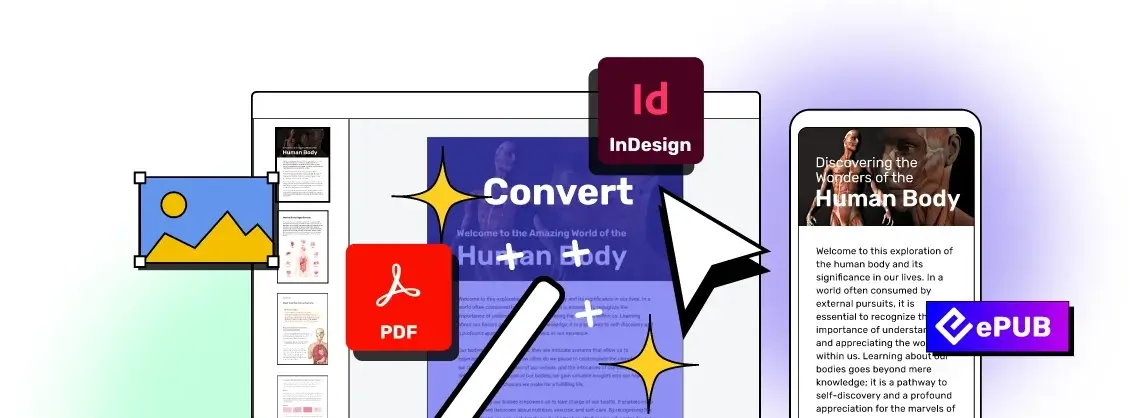
Digital Content Evolution: Impacting Global Publishing Trends
Digital transformation has changed the way readers consume content. The shifts have happened so quickly with the growth of social media, social shopping, and other online activities that publishers have had to adapt quickly to keep pace and stay relevant.
New consumption habits have had a global impact on digital publishing, nudging the industry to become more agile, tech-enabled, collaborative, and consumer-centric.
For instance, the growing consumption of eBooks has spearheaded the adoption of the ePUB file format. Specifically suited for eBooks, the ePUB helps unlock a superior user experience packed with interactivity and engagement.
The use of automated, cloud-based digital publishing platforms like KITABOO, for instance, is enabling publishers to build innovative digital content and deliver differentiated products to consumers.
This blog deconstructs the global impact on digital publishing forecasted for 2024.
TABLE OF CONTENTS :
I. Overview Of Digital Publishing
II. Top Trends Driving Global Impact On Digital Publishing
- Growing Demand for eBooks
- Popularity Of ePUB over PDF
- Growing Adoption Of AI in Publishing
- Shift to Interactive Digital Content
- A Data-Driven Publishing Culture
- Automated Publishing Process
- Adoption of Digital Rights Management (DRM) Tech
- Rise of the Digital Publishing Ecosystem
- Building Inclusive Content
- Data Security, a Top Priority
- Collaborative Technology
Overview Of Digital Publishing
Digital transformation is changing the way users engage in a wide range of online activities, including reading and engagement with digital content. Consumer needs are evolving with more emphasis on enhanced, superior user journeys. Such expectations are having a global impact on the digital publishing industry.
Contemporary eBooks, for instance, are beginning to look vastly different from early PDF-format eBooks. Consumers seek interactive, immersive experiences instead of static, linear ones. To meet these expectations, publishers must equip themselves with the right technology to produce engaging content at scale.
For instance, the adoption of a cloud-based, AI-powered, fully automated digital textbook publishing platform such as KITABOO is helping publishers in the educational domain revolutionize the way they create, publish, market, and distribute to learners across the world.
Learners are able to study in diverse ways, take assessments and receive instant reports, learn concepts by viewing multiple content formats, and consume content in the language of their choice.
Top Trends Driving Global Impact On Digital Publishing
Here’s a look at the top trends having a global impact on digital publishing in domains such as education, children’s books, and other genres.
1. Growing Demand for eBooks
Today, a growing audience prefers buying eBooks to physical books due to the reduced costs and convenience of access.
Consumers have access to digital libraries that unlock millions of affordable eBooks with a few clicks. This is one of the many reasons that contribute to the projection that eBooks’ market share will rise to $297.40 million by 2029.
2. Popularity Of ePUB over PDF
PDF eBooks are much harder to navigate on a laptop or mobile phone. Their low readability is disruptive to the reading process.
These challenges have led to more publishers adopting the ePUB format to publish eBooks due to its responsive qualities across a wide range of devices.
3. Growing Adoption of AI in Publishing
As publishers aspire to scale their businesses, the use of AI becomes inevitable.
AI is being leveraged in several ways—to create content at scale, forecast user behavior, and create profiles. Algorithms can be used to predict a book’s success potential based on its genre, author profiles, and market demand.
4. Shift to Interactive Digital Content
The interactive nature of the Internet and all things digital is also influencing the way readers consume books. Today, eBooks are becoming more interactive in multiple ways.
Besides introducing features such as search, comments, highlights, and read-aloud, publishers are embedding relevant multimedia alongside text, images, and hyperlinks to generate an immersive experience.
By leveraging intuitive, AI-powered platforms such as KITABOO, they can automate the process and add multimedia elements in a manner that enhances content, not disrupts it.
5. A Data-Driven Publishing Culture
Access to superior-quality, drilled-down data is enabling publishers to track user engagement closely. They can shape content and marketing strategies based on real numbers rather than intuition.
6. Automated Publishing Process
Today, the entire publishing workflow can be automated, reducing human intervention on labor-intensive tasks, such as editing and proofreading for instance. Publishing teams can focus on more strategic and creative tasks that drive readership and sales.
7. Adoption of Digital Rights Management (DRM) Tech
The growth of plagiarism and online piracy is a growing concern for publishers.
These activities eat into revenues and result in copyright violations, which has had a global impact on digital publishing technology. Innovation in DRM technology helps publishers control access to their content and automate access for authorized users.
8. Rise of the Digital Publishing Ecosystem
Today, publishers can not only leverage superior publishing technology but also benefit from the growth of eBook stores and Readers. This helps readers discover, buy, and access eBooks according to their needs. Such a robust ecosystem is helping the publishing market and distributing books efficiently and at scale.
9. Building Inclusive Content
There’s a growing focus on making content accessible to all – from those with physical disabilities and learning challenges to those restricted due to language barriers. This expectation has had a global impact on digital publishing.
Publishers are pushing to create eBooks and other digital content accessible to a wider spectrum of audiences. Digital publishing platforms such as KITABOO for instance, not only enable publishers to align their products with global accessibility policies and sustainable development goals but simultaneously help them cost-effectively capture larger market share.
10. Data Security, a Top Priority
Data security is a growing concern for authors, publishers, and other creators. High-quality digital content takes great effort to create.
Rather than opting for conversion and digital publishing free-to-use tools, there’s a shift towards adopting cloud-based, AI-powered tools that prioritize the safety of all data during the creation and distribution process and beyond.
11. Collaborative Technology
The use of smart tools is enabling global teams to collaborate, seamlessly from multiple locations while eliminating the back-and-forth of content for approvals. Changes can be done and saved on the page, with multiple stakeholders working simultaneously, thus taking a product to market faster.
The Takeaway
The publishing world in a post-digital world is transforming at a much faster pace than ever before. Publishers, authors, and creators must stay abreast of new trends and understand their global impact on digital publishing to capitalize on opportunities.
Publishing houses can use digital publishing platforms, such as KITABOO, to create premium, interactive books for global audiences. Our cloud-based digital publishing platform is available in both a licensed version (one-time purchase) and a flexible subscription model.
Want to know more? Request a demo today!
Discover how a mobile-first training platform can help your organization.
KITABOO is a cloud-based platform to create, deliver & track mobile-first interactive training content.




